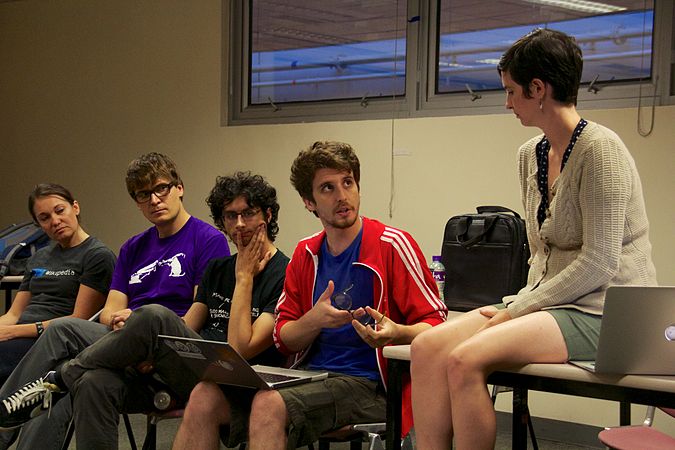Chapters Dialogue/Insights/Measuring success/de
Erfolg messen Einfluss ist ein anderer Begriff, der früher benutzt wurde, bei dem wir aber keinen Konsens über die Bedeutung und Messung erlangen konnten. Die Debatte über Einfluss und Metrik ist sehr bedeutend in der Bewegung und wirft die Frage auf: Welche Daten und Metren sind nötig, um den Erfolg oder Misserfolg von Aktivitäten bewerten zu können. Natürlich ist es schwierig, Metren zu definieren, wenn die bedeutende und grundlegende Frage ohne Antwort bleibt: "Was sind die richtigen Dinge, die zu erledigen sind?" Folglich haben auch solche Aktivitäten und Projekte, die Zustimmung erhalten haben (durch Zuschüsse, fortlaufende oder sich wiederholende Ausführung und Nennung in der Presse), nicht unbedingt Erfolg. The WMF faces a lot of pressure from its stakeholders and needs to ensure responsible handling of donors’ money, worldwide. They need to “detect the black sheep” that could exploit the openness of the Wikimedia movement. Therefore, there need to be rules: metrics, measurements and application procedures. Due to the high complexity, not all of them can be tailored according to individual context needs. WMF intends to create processes that are fair, participatory and used as an advising and learning tool. Together with programme leaders from within the ranks of Chapters and the community, the WMF is developing evaluation tools and learning patterns. Yet, Chapters are having difficulties to to apply metrics and processes in order to justify their budget and prove the impact of their activities. As described in previously, the goals and values are influenced by the individual context of each Wikimedian or Wikimedia organisation. And with differing goals there are differing conceptions of success. In addition, most Wikimedians are driven by the volunteerism, by the great sense of doing something good. They often conduct all these activities in their free time, in addition to their full-time job or university studies. For some, being an active volunteer and engaging in different activities already is a success. In the eyes of many Chapters, this volunteer spirit should be celebrated, but instead – as many see it – attempts are made to try to measure it and to compare it to metrics and processes, to frameworks of efficiency and effectiveness. For many Wikimedians, it feels as if they need to “force themselves” into the established metrics of the WMF, in order to fit somehow. In many cases, Chapters are engaging in “on the ground” basic work in terms of Free Knowledge (exploring new territory). It is known that in some areas, like education, are reacting very slowly to any change and that activities in the present might show their effects only in ten or twenty years. Consequently, there are no immediate results of Chapters’ activities. For short-term activities, one could measure the outcome in Kilobyte text that has been created in the course of a project, but how about long-term impact work? Some activities are created from scratch, without a blueprint from other organisations, and it’s hard to tell how their impact can be measured. Many interviewees stated that they have difficulties to directly translate their activities into success measures. In this situation, Chapters fear that they might look useless and unsuccessful – and this feeds back to the existing insecurity. To sum up, the topics metrics, measurements and reports are a big source of frustration among Chapters. At the same time, no matter if it’s the WMF, the FDC or affiliates, the whole movement is going through the challenge of evaluating its work in an adequate way. The key question remains: How can the movement combine experimentation and exploration of new territory with solid metrics? |
Learn more about
Or go back to
|




